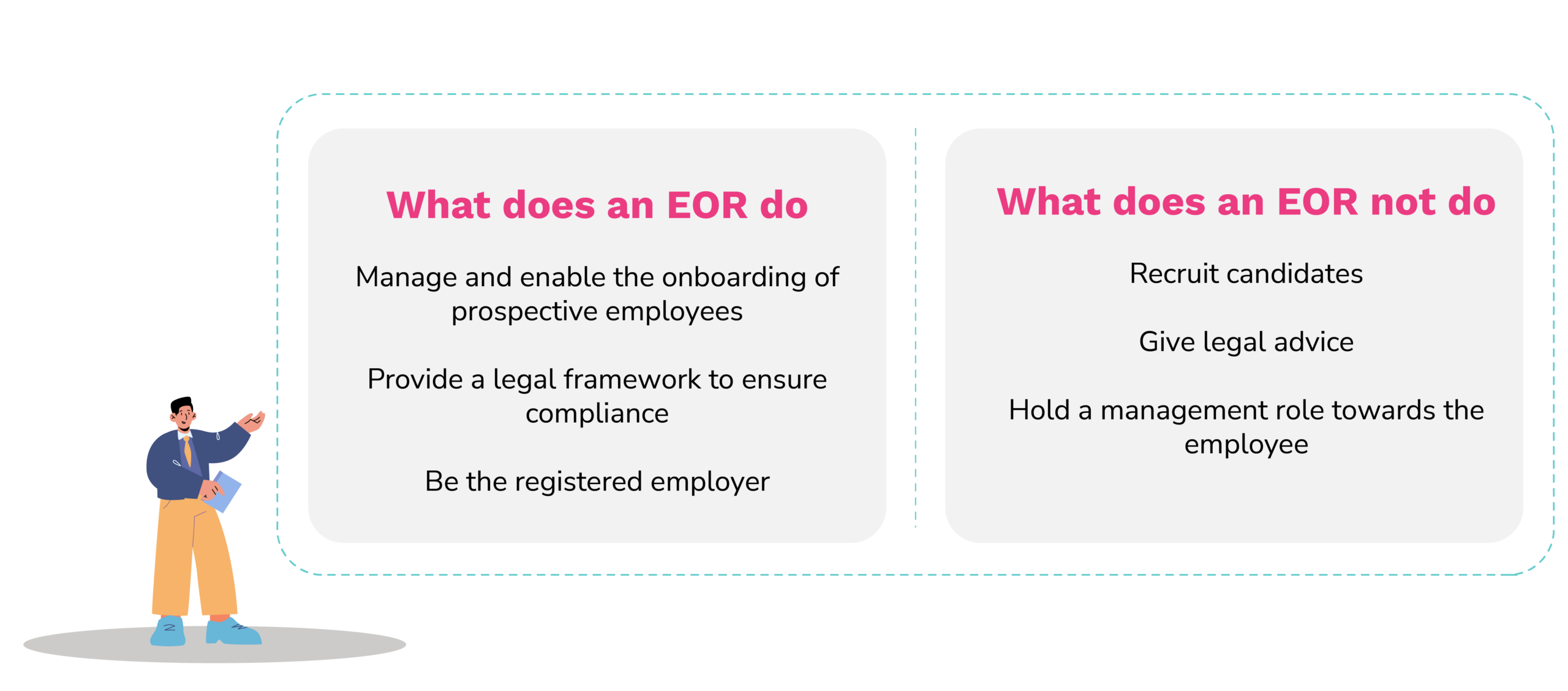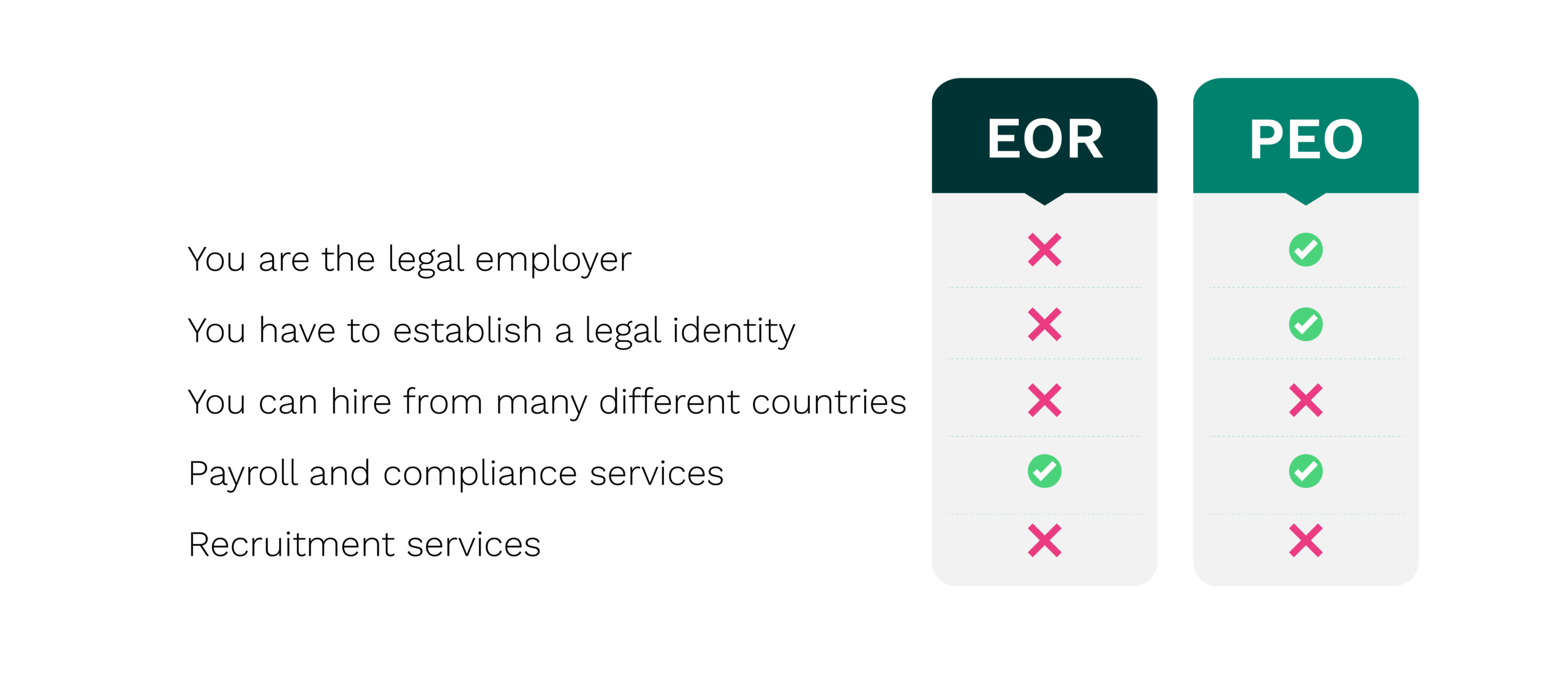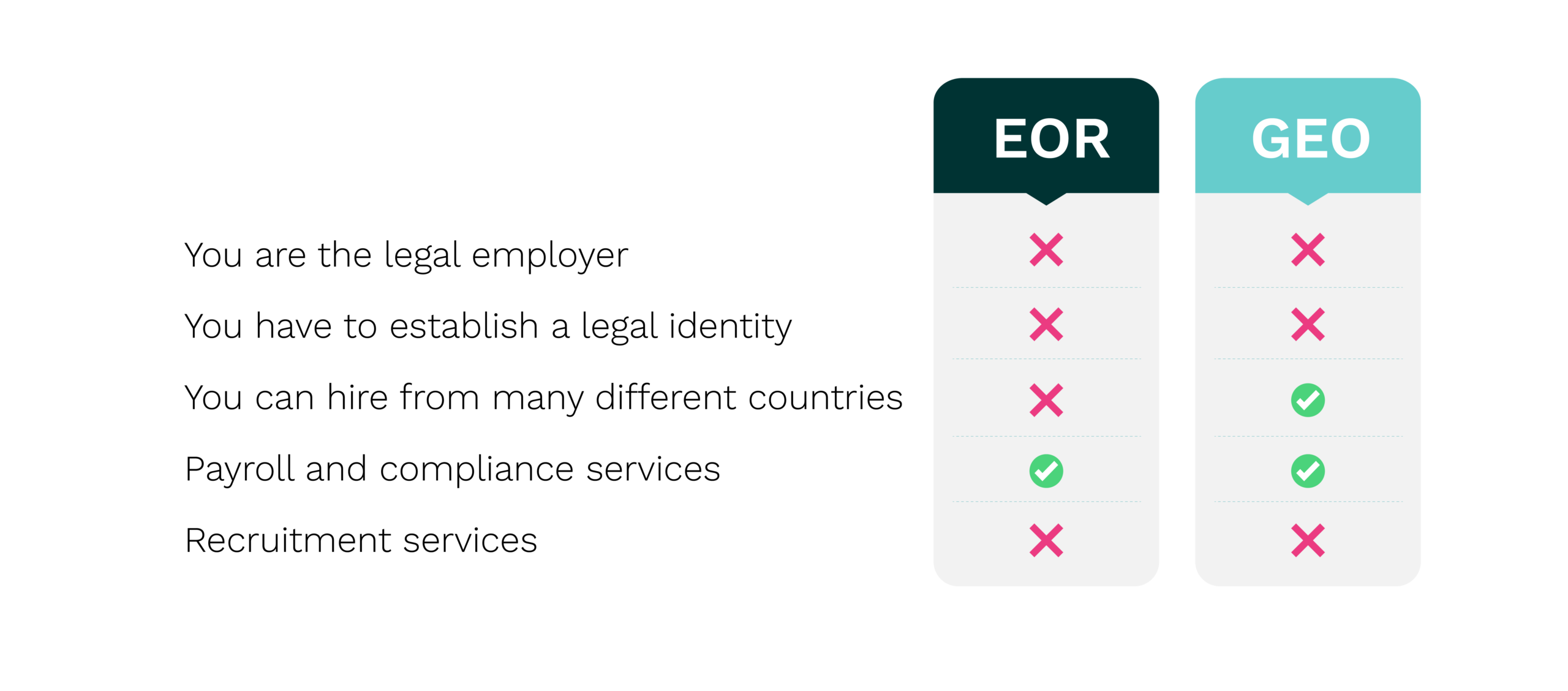When building and growing a global company, hiring remote workers located overseas is almost inevitable. This can come as a headache for many organisations since an important number of countries require you to establish a local legal entity to cover aspects such as payroll and country-specific tax laws in order to operate compliantly, which is costly as well as time-consuming.
Unless you incorporate an Employer of Record (EoR) Model.
What is an Employer of Record (EOR)?
To put it simply, an Employer of Record is a third-party organisation—sometimes referred to as a global Employer of Record—that takes on a significant amount of the work involved when hiring abroad.
An EOR company does not recruit, but gets involved in the process once the company has selected a candidate.
By providing all the necessary support, a remote Employer of Record makes sure that the customer acts compliantly throughout and moves within the safety of the framework that is provided.
This framework covers information such as minimum wages, collective bargaining agreements, taxes, social contributions, and similar charges, following the local labor laws in the respective country where the talent is located.
Further, an EOR is the registered employer for the worker while not holding a management role towards the employee. The original employer is the one making the decisions on compensation, position duties, projects and terminations.

5 Use Cases for an Employer of Record
An EOR company holds many important benefits for your company. Depending on your personal goals and challenges, an EOR service can target those areas and help you shoulder those tasks.
In most cases, a company will be able to best profit from a global Employer of Record when it comes to tackling the complexity and compliance risk of a new foreign market.Here are 5 use cases in which your organisation will profit from an Employer of Record:
1. Expanding without a legal entity
When expanding, setting up a local entity via incorporation and registration can be very time-consuming and costly, needing expertise and knowledge about the legal characteristics of the new country in order to remain compliant.
Here, a global Employer of Record might be the better alternative, supporting the company by handling payroll as well as employment and immigration requirements of the host country.
For example, if your company is entering Germany, working with an Employer of Record in Germany saves you from having to register a local entity while still ensuring full compliance.The EOR would be an intermediary between the client company and assignee, helping to ensure compliance through its network and expertise.
2. Hiring internationally: easy and compliant
The increasing popularity of remote work has eliminated geographical barriers, facilitating access to global talent.
This is a great opportunity for companies to improve their diversity agenda in terms of gender, disability, and many more, but also in terms of ethnicity and origin, since employees will not need to relocate in order to work for your organisation.
A study conducted by the Boston Consulting Group showed that a strong diversity strategy is a key innovation driver, increasing revenue by up to 19%.
However, this model brings new challenges, such as company compliance with a distributed workforce. Remote Employer of Record providers can provide you with the needed information and legal framework to make sure you are acting compliantly according to the local legislation.
3. Transitioning to remote-first
An increasing number of employers are exploring the option of becoming a hybrid or even a remote-first organisation.
A recent McKinsey study showed that the pandemic has accelerated the trend of remote work, with companies planning to shift to more flexible workspaces.
Further, in another McKinsey study, the number of executives interviewed who stated that “at least one-tenth of their employees could work remotely two or more days a week” almost doubled from 8% to 15% from before to after the pandemic.
This, however, is a complex process that requires many changes within your organisation, especially in HR related topics. Compliance will also become increasingly complicated, having to take into consideration the legal framework of the countries where your employees are located, including tax law and labor law compliance, social security, and data protection.
With an EOR company, your organization will be able to give this approach a trial phase with a smaller number of employees. This would result in a smooth transition as well as in important financial and time savings.
4. Converting freelancers into employees
Many companies profit from an alternative workforce, such as freelancers and contractors. Yet, you might consider converting freelancers to employees to reduce the turnover rate of your organisation, have more control over working hours, as well as to avoid compliance issues such as misclassification, putting organisations at risk for owing back taxes and benefits, which can result in painful penalties.Some countries have introduced new legislation or updated their already existing legislation involving misclassification, such as the UK with the IR35, making sure “that workers, who would be classed as an employee if they were contracted directly, pay broadly the same Income Tax and National Insurance contributions as employees”.
An EOR can help you retain this talent and support you in your long-term workforce planning, including the transition period and HR processes to remain compliant.
5. Offering more flexibility to your employees
Global Studies conducted by ManpowerGroup indicate that 30-40% of employers worldwide experienced a shortage of workers in 2006, with a growing trend since 2009. This issue makes talent attraction as well as retention of paramount importance.
Coming out of the pandemic, provide employees with as much mobility, freedom, and flexibility as possible. If an employee is considering moving to another country, don’t make this a reason for letting them go. Being able to maintain your talent even if they wish to move abroad for an indefinite amount of time will not only reduce your turnover rate but can also strengthen your employer brand and therefore talent attraction.An EOR will be able to support you during the process, being in charge of the labor law, payroll differences, and further aspects that need to be taken into account when wanting to remain compliant.

Employer of Record and Global Payroll Management
One of the biggest challenges in international hiring is payroll. Different countries have different rules for taxation, social contributions, and reporting. Without expertise, it’s easy to make mistakes that can lead to penalties. A global Employer of Record takes this burden off your shoulders. Whether you’re paying employees in Germany, Brazil, or Spain, the EOR company ensures payroll is processed correctly and on time. For organisations testing a new market, working with an Employer of Record in Germany can be especially valuable, as German payroll laws are strict and often complex. By using a remote Employer of Record, you don’t need to worry about local banking requirements, exchange rates, or social security obligations. Everything is managed under one streamlined global payroll framework.Risk Mitigation Through an Employer of Record
Compliance risks are one of the main reasons companies turn to an EOR company. Hiring workers abroad without a proper structure can lead to fines, penalties, or even being banned from operating in a market. A global Employer of Record reduces this risk by ensuring compliance with labour law, tax regulations, and employee rights in every country. For example, working with an Employer of Record in Germany ensures that employees are protected under German employment law while giving your company the flexibility to operate without a local entity. For startups and fast-growing companies, this makes scaling internationally safer and much faster.Employer of Record VS. Professional Employer Organisation (PEO)
While both Employer of Record Organisations and Professional Employer Organisations act as an extension of your company, there are 4 key differences between PEO and EOR:Are you replacing or complementing?
A PEO takes on most of your HR related functions, almost replacing your HR department. These functions include the onboarding of employees, terminations, health insurance, taxes, etc., while putting all of your employees onto its payroll.
With an EOR company, you only outsource a part of the HR work related to global hiring, making the life of your HR department easier. Further, in this model, you only put your global employees on its payroll.
Number of employees
With an Employer of Record (EOR), your company has the flexibility to hire one employee or build a team of ten or more abroad, all while sidestepping the complication of foreign labor laws. PEOs have a threshold on the number of employees; you can’t have the same degree of flexibility with them that you can have with EORs. Whether you’re testing a market with a single engagement or growing quickly with a series of employees, EORs are more suitable for your hiring needs.By handling compliance with local tax, insurance, and employment regulations, an EOR ensures your business can expand globally while staying agile and legally protected.
Insurance coverage
While EORs provide general liability as well as workers’ compensation, making sure the employees that are put on their payroll are covered for damages, PEOs may require you to provide your insurance.
Business registration
Not needing to set up a local branch abroad might be the greatest advantage of an EOR. A remote Employer of Record allows you to hire globally without needing to register your company in that specific country. A PEO will not be able to take that off your plate.

Employer of Record VS. Global Employment Organisation (GEO)
To put it simply, a GEO is a global structure that uses EORs in each country of employment. Global Employment Organisation holds an oversight role, making sure that the EOR company meets all deadlines and that compliance is maintained. Further, the EOR starts to get involved and sort the onboarding and payroll of the client once the GEO has finished the initial talks.While an EOR will not source the talent for your company, a GEO can look into the local talent of each new country.

The future of global employment using an Employer of Record
Whether you choose a GEO, PEO, or EOR ultimately depends on your company’s needs and future goals. All together, the benefits of using a global Employer of Record model become apparent when you look at how time-consuming and costly it is to establish a local branch abroad.An EOR company takes on the responsibility to ensure a smooth and compliant onboarding of the employee in question and provides you with a framework ensuring that you and your company remain as compliant as one can be when engaging workers, no matter where, giving you the freedom to focus on the future goals of your company.
We can help you hire abroad
With WorkMotion, we enable global employment at the push of a button. We will help you hire from a global talent pool and onboard your prospective workers in only three days. As a trusted remote Employer of Record, we provide secure and on-time payments in a foreign currency, a suitable benefit package, and, of course, ensure full compliance.









